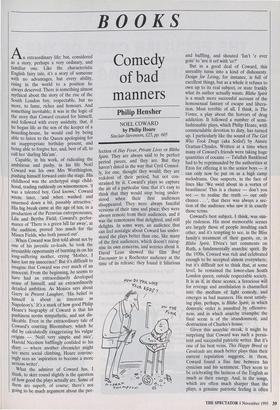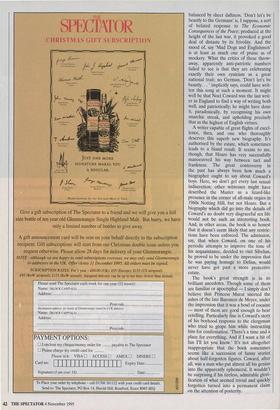BOOKS
Comedy of bad manners
Philip Hensher
NOEL COWARD by Philip Hoare Sinclair-Stevenson, £25, pp. 605 An extraordinary life; but, considered as a story, perhaps a very ordinary, and familiar one. Like the characteristic English fairy tale, it's a story of someone with no advantages, but every ability, rising in the world to a position he always deserved. There is something almost mythical about the story of the rise of the South London boy, respectable, but no more, to fame, riches and honours. And something inevitable; it was in the logic of the story that Coward created for himself, and followed with every assiduity, that, if he began life as the son of the keeper of a boarding-house, he would end by being able to listen to the Queen apologising for an inappropriate birthday present, and being able to forgive her, and, best of all, to call her 'darling Ma'am'.
Capable, in his work, of ridiculing the ambitious and pushy, in his life Noel Coward was his own Mrs Worthington, pushing himself forward onto the stage. His childhood was the archetypal stage child- hood, trading ruthlessly on winsomeness. 'I was a talented boy, God knows,' Coward wrote later, 'and when washed and smarmed down a bit, passably attractive.' His big break came at the age of ten, in a production of the Peruvian entrepreneuses, Lila and Bertha Field; Coward's perfor- mance of 'There is a green hill far away', at the audition, proved 'too much for the Misses Fields, who both passed out'.
When Coward was first told about sex by one of his juvenile co-leads, he took the irresistible opportunity of bursting in on his long-suffering mother, crying 'Mother, I have lost my innocence!' But it's difficult to imagine that Coward was ever much of an innocent. From the beginning, he seems to have had an extraordinarily developed sense of himself, and an extraordinarily detailed ambition. As Monica says about Garry in Present Laughter, 'His belief m himself is about as timorous as Napoleon's.' It's a mark of how good Philip Hoare's biography of Coward is that his pushiness seems sympathetic, and not dis- likeable. Even in the extraordinary tale of Coward's courting Bloomsbury, which he did by calculatedly exaggerating his vulgar origins — 'Noel very simple and nice', Harold Nicolson bafflingly confided to his diary — where another chronicler might see mere social climbing, Hoare convinc- ingly sees an 'aspiration to become a more serious writer'.
What the admirer of Coward has, I think, to skirt round slightly is the question of how good the plays actually are. Some of them are superb, of course; there's not going to be much argument about the per- fection of Hay Fever, Private Lives or Blithe Spirit. They are always said to be perfect period pieces, and they are. But they haven't dated in the way that Cyril Connol- ly, for one, thought they would; they are redolent of their period, but not con- strained by it. Coward's plays so capture the air of a particular time that it's easy to think that they would stop being under- stood when their first audiences disappeared. They were always fanciful versions of their time and place; they were always remote from their audiences, and it was the remoteness that delighted, and still delights. In some ways, an audience that can feel nostalgic about Coward has under- stood the plays better than one, like many of the first audiences, which doesn't recog- nise its own concerns, and worries about it. David Lean showed the film Brief Encounter to a Rochester audience at the time of its release; they found it hilarious and baffling, and shouted 'Isn't 'e ever goin' to 'ave it orf with 'er?'
But in a good deal of Coward, this unreality turns into a kind of dishonesty. Design for Living, for instance, is full of excellent things, but as a whole it refuses to own up to its real subject, or state franldy what its author actually wants. Blithe Spirit is a much more successful account of the homosexual fantasy of escape and libera- tion. Most terrible of all, I think, is The Vortex, a play about the horrors of drug addiction. It followed a number of semi- fashionable plays, which Philip Hoare, with commendable devotion to duty, has turned up. I particularly like the sound of The Girl Who Took Drugs (aka Soiled) by Aimee Grattan-Clyndes. Written at a time when many of Coward's friends were taking huge quantities of cocaine — Talullah Bankhead had to be reprimanded by the authorities at Eton for offering it to the senior boys — it can only now be put on as a high camp melodrama. One suspects, in the face of lines like 'We swirl about in a vortex of beastliness! This is a chance — don't you see — to realise the truth — our only chance . . . ', that there was always a sec- tion of the audience who saw it in exactly those terms.
Coward's best subject, I think, was sim- ple rudeness. His most memorable scenes are largely those of people insulting each other, and it's tempting to see, in the Bliss family's treatment of their guests, or, in Blithe Spirit, Elvira's tart comments on Ruth, a fundamentally anarchic spirit. By the 1930s, Coward was rich and celebrated enough to be accepted almost everywhere; but it's difficult not to think that, at some level, he remained the lower-class South London queen, outside respectable society. It is as if, in these scenes, a ferocious will for revenge and annihilation is channelled into the medium of light comedy, and emerges as bad manners. His most satisfy- ing play, perhaps, is Blithe Spirit, in which domestic order is assaulted by offensive- ness, and in which anarchy triumphs; the final scene is of the abandonment, and destruction of Charles's house.
Given this anarchic streak, it might be surprising that Coward was such a persis- tent and successful patriotic writer. But it's one of his best veins. This Happy Breed or Cavalcade are much better plays than their current reputation suggests; in them, Coward found a fine line between his cynicism and his sentiment. They seem to be celebrating the laziness of the English as much as their energy. And, in the songs, which are often much sharper than the plays, a genuine patriotic feeling is often balanced by sheer daftness. 'Don't let's be beastly to the Germans' is, I suppose, a sort of belated response to The Economic Consequences of the Peace; produced at the height of the last war, it provoked a good deal of distaste by its frivolity. And the mood of, say 'Mad Dogs and Englishmen' is at least as much one of praise as of mockery. What the critics of these throw- away, apparently anti-patriotic numbers failed to see is that they are celebrating exactly their own cynicism as a great national trait; no German, 'Don't let's be beastly. .. ' implicitly says, could have writ- ten this song at such a moment. It might well be that Noel Coward was the last writ- er in England to find a way of writing both well, and patriotically; he might have done it, paradoxically, by recognising his own anarchic streak, and upholding precisely that as the highest of English virtues.
A writer capable of great flights of excel- lence, then, and one who thoroughly deserves this superb new biography. It's authorised by the estate, which sometimes leads to a bland result. It seems to me, though, that Hoare has very successfully manoeuvred his way between tact and frankness. The great controversy in the past has always been how much a biographer ought to say about Coward's boys. Here, we don't get every last sexual indiscretion; other witnesses might have described the Master as a lizard-like presence in the corner of all-male orgies in 1960s Notting Hill, but not Hoare. But a biography which did go into the details of Coward's no doubt very disgraceful sex life would not be such an interesting book. And, in other areas, the book is so honest that it doesn't seem likely that any restric- tions have been enforced. The admission, say, that when Coward, on one of his periodic attempts to improve the tone of his acquaintance, decided to visit Sibelius, he proved to be under the impression that he was paying homage to Delius, would never have got past a more protective estate.
The book's great strength is in its brilliant anecdotes. Though some of them are familiar or apocryphal — I simply don't believe that Princess Murat snorted the ashes of the late Baroness de Meyer, under the impression that it was a bowl of cocaine — most of them are good enough to bear retelling. Particularly fine is Coward's story of his boyhood response to the clergyman who tried to grope him while instructing him for confirmation. 'There's a time and a place for everything. And if I want a bit of fun I'll let you know.' It's not altogether inappropriate that the book sometimes seems like a succession of funny stories about half-forgotten figures. Coward, after all, was a man who put almost all his genius into the apparently ephemeral. It wouldn't be surprising if his tireless, admirable glori- fication of what seemed trivial and quickly forgotten turned into a permanent claim on the attention of posterity.











































































 Previous page
Previous page